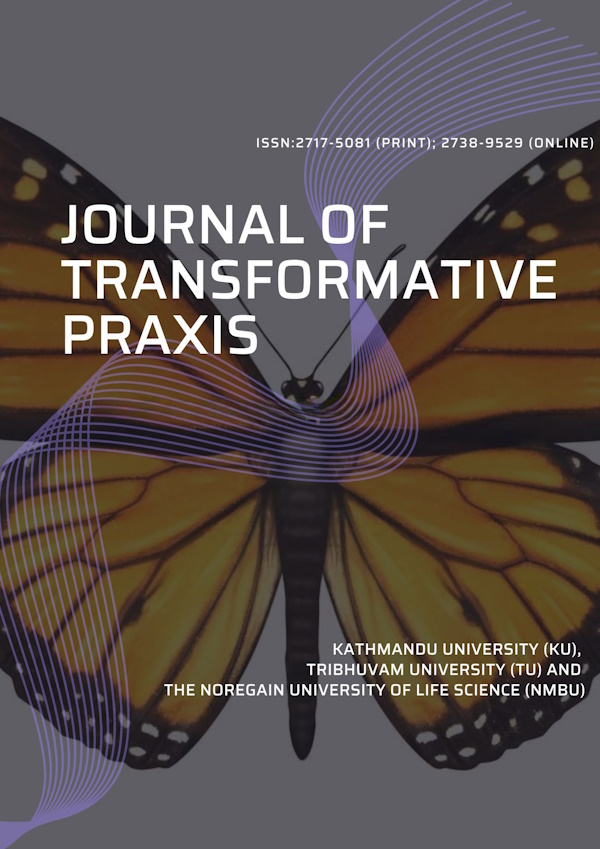
Journal of Transformative Praxis, Volume 1, Issue 1, 2020, 9-24, https://doi.org/10.3126/jrtp.v1i1.31757
Online publication date: Jun 30, 2020
Publication date: Dec 31, 2020
Views: 568 | Downloads: 273
Reference: Varghese, J. (2020). Connecting Mathematics Education to my Relationship with the Cosmos. Journal of Transformative Praxis, 1(1), 9-24. https://doi.org/10.3126/jrtp.v1i1.31757
Reference: Varghese J. Connecting Mathematics Education to my Relationship with the Cosmos. Journal of Transformative Praxis. 2020;1(1):9-24. https://doi.org/10.3126/jrtp.v1i1.31757
Reference: Varghese J. Connecting Mathematics Education to my Relationship with the Cosmos. Journal of Transformative Praxis. 2020;1(1), 9-24. https://doi.org/10.3126/jrtp.v1i1.31757
Reference: Varghese, Jiju. "Connecting Mathematics Education to my Relationship with the Cosmos". Journal of Transformative Praxis 2020 1 no. 1 (2020): 9-24. https://doi.org/10.3126/jrtp.v1i1.31757
Reference: Varghese, J. (2020). Connecting Mathematics Education to my Relationship with the Cosmos. Journal of Transformative Praxis, 1(1), pp. 9-24. https://doi.org/10.3126/jrtp.v1i1.31757
Reference: Varghese, Jiju "Connecting Mathematics Education to my Relationship with the Cosmos". Journal of Transformative Praxis, vol. 1, no. 1, 2020, pp. 9-24. https://doi.org/10.3126/jrtp.v1i1.31757
- Alvarez, P. (2010). Healing a broken world. http://www.sjweb.info/sjs/PJnew/
- Baptist, K. W. (2002). The garden as metaphor for curriculum. Teacher Education Quarterly, 29(4), 19-37.
- Chawla, L., & Cushing, D. F. (2007). Education for strategic environmental behavior. Environmental Education Research, 13(4), 437-452.
- Coertjens, L., Boeve-de Pauw, J., De Maeyer, S., & Van Petegem, P. (2010). Do schools make a difference in their students’ environmental attitudes and awareness? Evidence from PISA 2006.
- Cortese, A. D. (2003). The critical role of higher education in creating a sustainable future. Planning for higher education, 31(3), 15-22.
- Duerden, M. D., & Witt, P. A. (2010). The impact of direct and indirect experiences on the development of environmental knowledge, attitudes, and behavior. Journal of Environmental Psychology, 30(4), 379-392.
- Gellert, U. (2011). Now it concerns us! A reaction to sustainable mathematics education. For the Learning of Mathematics, 31(2), 19-20.
- Hawking, S.. BrainyQuote.com. Retrieved June 14, 2017, from BrainyQuote.com Web site: https://www.brainyquote.com/quotes/quotes/s/stephenhaw627095.html
- Hesse, H. (1922). Siddhartha, (Hilda Rosner, Trans.) New Delhi: Rupa and Co.
- Holley, P. (2017, May 5). Stephen Hawking just moved up humanity’s deadline for escaping Earth. Retrieved from https://www.washingtonpost.com/news/speaking-of-science/wp/2017/05/05/stephen-hawking-just-moved-up-humanitys-deadline-for-escaping-earth/?utm_term=.fbca5f82ec17
- Jablonka, E. (2003). Mathematical literacy. In Second international handbook of mathematics education (pp. 75-102). Springer: Dordrecht.
- Jesuit Conference of South Asia. (2008). Decrees of General Congregation 35.
- Kollmuss, A., & Agyeman, J. (2002). Mind the gap: why do people act environmentally and what are the barriers to pro-environmental behavior? Environmental Education Research, 8(3), 239-260.
- Krishnanada, S. Attainment of the Infinite. Retrieved from http://www.swami-krishnananda.org/infinite/Attainment_of_the_Infinite.pdf
- Liefländer, A. K., Fröhlich, G., Bogner, F. X., & Schultz, P. W. (2013). Promoting connectedness with nature through environmental education. Environmental Education Research, 19(3), 370-384.
- Loyola, I. (1993). The Spiritual Exercises of St. Ignatius, Ganss, GE, SJ (Trans.). Anand: Gujarat Sahitya Prakash.
- Luitel, B. C. (2012). A multi-paradigmatic approach to researching lived experiences in Mathematics education: Contemplating possible connections. A paper from an International STEM Research Symposium WISDOMe Monograph# 3. WY: University of Wyoming.
- Luitel, B. C. (2013). Mathematics as an im/pure knowledge system: symbiosis, (w) holism and synergy in mathematics education. International Journal of Science and Mathematics Education, 11(1), 65-87.
- Luitel, B. C., & Taylor, P. C. (2007). The Shanai, the Pseudosphere and other imaginings: Envisioning culturally contextualised mathematics education. Cultural Studies of Science Education, 2(3), 621-655.
- McAvoy, M. E. (2013). Training Faculty to Adopt the Ignatian Pedagogical Paradigm, IPP and its Influence on Teaching and Learning: Process and Outcomes. Jesuit Higher Education: A Journal, 2(2), 61-109.
- Mezirow, J. (1997). Transformative learning: Theory to practice. New directions for adult and continuing education, 1997(74), 5-12.
- Mezirow, J. (2003). Transformative learning as discourse. Journal of transformative education, 1(1), 58-63.
- Painadath, S. (2009). The power of silence. Delhi: ISPCK.
- Pope Francis, (2013). Encyclical Letter Laudato Si'of the Holy Father Francis: On Care for Our Common Home. Vatican Website.
- Rayan, S., & Kunnumpuram, K. (2013). Selected writings of Samuel Rayan, SJ. Vol. III. Mumbai: St. Paul’s.
- Renert, M. (2011). Mathematics for life: Sustainable mathematics education. For the Learning of Mathematics, 31(1), 20-26.
- Riley-Taylor, E. (2002). Chapter Four: An Ecospiritual Ethic and Decisions of Responsibility. Counterpoints, 201, 97-124.
- Rousseau, C. (2012). Mathematics of Planet Earth 2013. Notices of the American Mathematical Society, 59(1), 5-6.
- Shephard, K. (2008). Higher education for sustainability: seeking affective learning outcomes. International Journal of Sustainability in Higher Education, 9(1), 87-98.
- Taylor, P. C., & Medina, M. (2011). Educational research paradigms: From positivism to pluralism. College Research Journal, 1(1), 1-16.
- Tolle, E. (2003). Stillness speaks. Mumbai: Yogi Impressions.
I would like to thank all my Jesuit companions for being there whenever I needed any help during my inquiry. I am highly obliged to those University family who taught metothink out of the boxregarding mathematicseducationand alsofor all the other assistance I received for the completion of this article.
I have not received any funding for doing this research.
This work is licensed under a Creative Commons Attribution-ShareAlike 4.0 International License.
